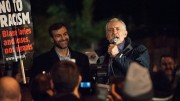Another good read that you should have a look at is this one from Dr Rakib Eshan over at Spiked. He’s saying a lot of what many of us outside of academia have been saying about the links between Islamic extremism and Islamic Jew hatred and is similar to what a writer at the New English Review said recently which this blog commented on.
Dr Eshan is claiming that those Muslims who are less integrated into mainstream society end up in echo chambers where ‘Zionist plot’ conspiracy theories are allowed to fester and spread unchecked. That claim looks pretty sensible and based in reality to me. After all if your social circle contains mostly those who believe in ‘Zionist plot’ guff then it’s likely that you will be influenced by them. He said that more integrated Muslims do not hold so strongly to anti Jewish views.
What should interest those who are concerned about the growth of Islamic extremism is something Dr Eshan said about how those who mix in circles that promote Jew hatred are also the same circles that are likely to promote Islamic extremism. I disagree with Dr Eshan about the value provided by groups like Muslims Against Anti-Semitism as ‘top down’ groups like this might get a Rabbi and an Imam working together but does little to stop Islamic Jew hatred in the parts of society that groups like this cannot reach or which reject them. Personal day to day contact between Jews and moderate Muslims, such as those who work together on the factory floor or in offices or other places of employment, may do more good than groups like Muslims Against Anti-Semitism.
Dr Eshan quite rightly aims some of his ire at the Progressives who have a racism of low expectations attitude towards Muslims and refuse to tackle Islamic extremism for fear of offending Muslims.
Dr Eshan said:
‘Progressive’ politicians – of all parties – should put aside their bigotry of low expectations, which often stops them from tackling Islamist extremism for fear that they might alienate Muslim communities. A comfortable majority of British Muslims are concerned by the threat of Islamist extremism. Indeed, a 2020 study published by Crest suggested that 63 per cent of British Muslims were worried about Islamist extremism – compared with 67 per cent for the general population.
He’s right there. The fear of alienating Muslim communities is at the heart of a lot of problems, including the Islamic extremism that the vast majority of Muslims worry about. It’s at the core of why the Islamic Rape Gangs were not properly tackled and why Britain has appalling and damaging speech codes that prevent vital and necessary criticism of Islam being voiced. Maybe if there was a culture where Islam was as easy and as legal to criticise as the Church of England is to criticise, we might be able to have the open debates on Islam and Islamic extremism that would benefit not only the majority population but also those Muslims who live in fear of the nutcases in their midst?





